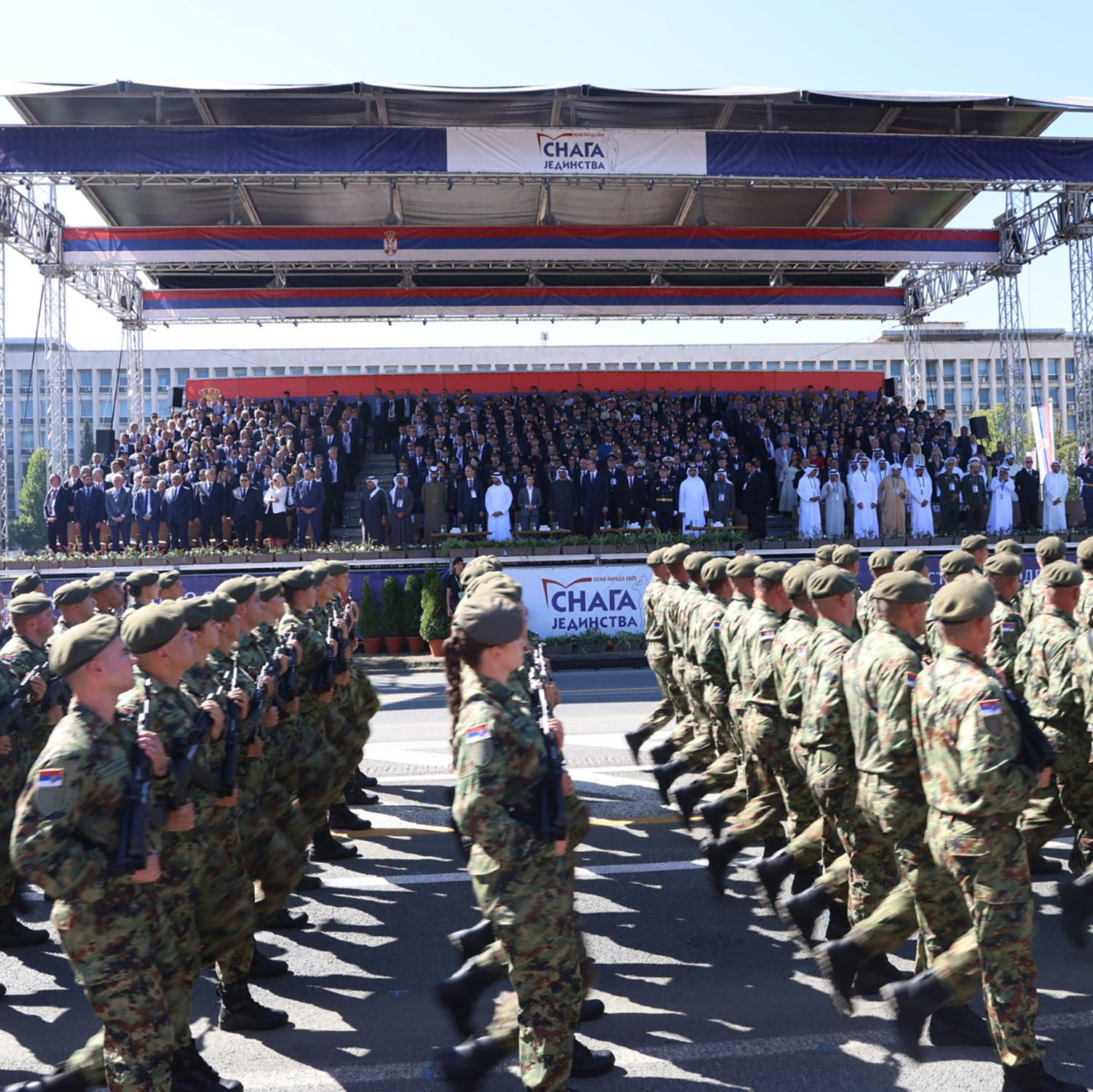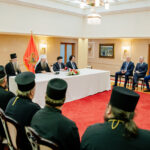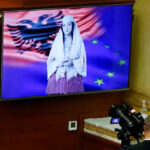- Dozens of people who underwent training in Serbia to organize riots were detained in Moldova
As a result of 250 searches conducted on 22 September in Moldova, a large amount of money, weapons, and ammunition was seized, and 74 people were detained, suspected of having undergone training in Serbia to organize mass riots during the parliamentary elections on 28 September.
These are people aged between 19 and 45 who, according to reports, systematically attended courses in Serbian military camps where they were taught to create provocations during protests, organize mass riots, and handle special equipment.
According to the head of the Intelligence and Security Service of Moldova (SIS) Aleksandar Musteața, this training was coordinated by Russian special services, in particular the Main Intelligence Directorate (GRU).
“The planning and coordination of the training in Serbia was carried out by a person who, on behalf of the Russian special services, introduced himself under the pseudonym ‘Bes’. The name and surname of this person will be established shortly. Another representative of the Russian special services who participated in coordinating several groups in Moldova was a citizen of the Russian Federation Andrey Pavlov,” said the head of the SIS at a press conference.
Musteața noted that Pavlov is suspected of planning and organizing several subversive actions on the territory of Moldova, financed by the Russian Federation, in particular through the network of fugitive oligarch Ilan Shor.
Head of the Prosecutor’s Office for Combating Organized Crime Victor Furtuna stated that the investigation into the preparation of mass riots began back in July 2025. During this time, it was possible to identify the activities of a group of persons who systematically traveled to Serbia to participate in training aimed at destabilizing the situation in the country. In particular, they were taught in Serbia to handle firearms and special means. For this, participants received about €400.
Head of the Police Viorel Cernăuțeanu stated that most of the participants were instructed by Russian citizens. Some Moldovans were persuaded to go to Serbia for training under the pretext of a pilgrimage. But once they were there, they were drawn into preparation for riots.
Security experts, including Predrag Petrović of the Belgrade Centre for Security Policy and military analyst Aleksandar Radić, believe that the Serbian special services “most likely were not surprised,” but remained silent to avoid diplomatic complications. According to them, Moscow uses Serbia as a “third country” to conceal its activities.
“Is Russia using Serbia as a pawn again?” ask opposition Serbian media.
- A military parade was held in Belgrade for the first time since 2014.
The occasion for holding the large-scale parade under the slogan “The Power of Unity” was the Day of Serbian Unity, Freedom, and the National Flag, which has been celebrated annually on 15 September since 2020.
More than 10,000 participants presented about 2,500 pieces of weaponry and military equipment.
“Ninety percent of the demonstrated equipment” is new, in total “a little more than 19 new pieces,” and “all branches of the Armed Forces of Serbia” are taking part in the parade, said Minister of Defence of Serbia Bratislav Gašić in a television interview.
During the parade, Chinese FK-3 (HQ-22) and PVD HQ-17A surface-to-air missile systems, the Russian electronic warfare system “Krasukha,” Airbus H145 helicopters, the Israeli multiple launch rocket system PULS, Israeli Hermes 900 drones, kamikaze drones from the UAE Shadow 50 and Shadow 25, new and modernized Yugoslav and Soviet armored vehicles and armored personnel carriers, Serbian-made anti-aircraft and artillery systems, and other military equipment were demonstrated.
On the Danube and Sava rivers, a parade of the river flotilla took place.
In the sky, in addition to modernized aircraft of the older generation, French Rafale fighter jets also flew by, similar to those that Belgrade agreed to buy from Paris. After participating in the military parade, the planes returned to France.
President of Serbia Aleksandar Vučić said on the eve of the parade that the military parade was being organized to demonstrate Serbia’s strength as a deterrent for any potential aggressor, in order to preserve peace.
“Serbia strives for peace and prosperity and knows how to preserve its dignity, territory, and future,” Vučić wrote after the parade on his Instagram account.
Unlike 2014, this year’s parade in Belgrade was held almost without the participation of world leaders.
Those who came to Belgrade to watch the parade included the President of the United Arab Emirates Sheikh Mohammed bin Zayed Al Nahyan, the Commander of the National Guard of the US state of Ohio, a general of the Chinese army, the ministers of defence of Cyprus, Hungary, and Azerbaijan, the Deputy Minister of Defence of France, and Milorad Dodik, who was recently deprived of the mandate of President of the Republika Srpska (Bosnia and Herzegovina).
The small number of foreign officials and the absence of representatives of the most powerful countries of Europe and the world “is an additional argument in favor of the thesis that the parade is intended for the domestic audience,” Vuk Vuksanović of the Belgrade Centre for Security Policy told the BBC.
Firstly, “this is a signal to the international audience that Serbia is strong, that it should be treated as a partner,” said the political scientist.
Secondly, it is a message to the domestic audience which, in Vuksanović’s opinion, is “much more important and stronger” for the ruling coalition under the current circumstances, when anti-government protests are ongoing in the country.
In his opinion, this is an attempt by the ruling coalition to consolidate the electorate, strengthen nationalist and patriotic sentiments of voters, and present the ruling team as strong leaders who care about the army, “one of the two institutions most trusted by citizens.”
- The Parliament of Albania approved the composition of the new government headed by Edi Rama.
82 deputies out of 140 voted for.
The Socialist Party, led by Edi Rama, for the fourth time in a row won a majority in the parliament in the elections held in May.
The main priority of the new government will be the country’s membership in the European Union by 2030, Rama noted in his speech in parliament. “European Albania is the guiding star on every page of our program and the metronome of the rhythm of every reform we will carry out,” he said.
In the new government, Pirro Vengu will remain Minister of Defence. Elisa Spiropali, who held the position of Speaker of the Albanian Parliament, was appointed Minister of Foreign Affairs.
International media paid attention to the “appointment” of the artificial intelligence bot Diella to a ministerial post; she will work in the field of public procurement. Before the government “appointment,” Diella served as a virtual assistant in the process of obtaining official documents on the e-Albania platform. In the government, her role will be to ensure that Albania, in Rama’s words, becomes “a country where public tenders are 100% free of corruption”.
During the presentation of the new government’s program, Edi Rama “gave the floor” to the Diella bot, but opposition deputies began to protest against the speech of artificial intelligence. In response, Rama stated: “If you do not allow normal debates here in this hall, we will move to a vote”. This is exactly what happened, and the government was formed within a few minutes, which caused outrage from the opposition, who blocked the hall and threw objects at cabinet ministers.
For the first time since the fall of communism, the legislative body of Albania adopted the government’s program without discussion. Opposition deputies threw copies of the Constitution onto the prime minister’s bench, accusing the Socialists of violating both parliamentary procedure and democratic norms.
Subsequently, the opposition Democratic Party demanded the annulment of the session. Party leader Sali Berisha accused Rama of “destroying” the parliament and compared him to dictator Enver Hoxha.
- The 28th Conference of the Chiefs of Defence of the Adriatic Charter (US–A5) took place.
The Conference in Tirana on 16–18 September was co-chaired by U.S. Air Force General Alexis Grinkevich, Commander of the United States European Command and Supreme Allied Commander Europe of NATO, together with Lieutenant General Arben Kingji, Chief of the General Staff of the Armed Forces of Albania, and Lieutenant General Gojko Knežević, Chief of the Joint Staff of the Armed Forces of Bosnia and Herzegovina.
In addition to the Chiefs of General Staff of the Adriatic Charter countries — Albania, Bosnia and Herzegovina, Croatia, Montenegro, and North Macedonia — and observer countries (Kosovo, Slovenia), the Deputy Commander of NATO Joint Forces Command Naples and senior officers of the U.S. National Guard from several states representing the Partnership Program with member and observer countries also took part in the event.
During the conference, military leaders of the Adriatic Charter countries and observer states discussed stability and cooperation through civil-military synergy and regional dialogue in the Western Balkans and reaffirmed their commitment to regional cooperation.
In his address at the conference, Grinkevich expressed optimism regarding the regional commitments to burden-sharing, cooperation, and stability.
“As our countries increase defence spending and take significant steps in military modernization, we must work together to ensure that investments translate into real capabilities,” he said. “This requires a constant focus on improving interoperability, increasing readiness, and developing sustainment arrangements. After all the positive discussions today, I am confident that we can achieve these goals”.
At the conclusion, the Chiefs of Defence signed a Joint Declaration highlighting the importance of regional cooperation, strengthening collective capabilities, and reinforcing Euro-Atlantic security, including full integration of Kosovo into this initiative.
The presence of representatives of Kosovo at the conference was the reason why, for the second year in a row, the event was held in Albania, since formally the official host of the 28th Conference of the Chiefs of Defence of the US–A5 Charter was Bosnia and Herzegovina. Albania agreed to be the “technical host,” as this was necessary to “bypass the diplomatic sensitivity” connected with the invitation of Kosovo, Bosnian media report.
According to journalists, the pressure for the conference not to be held in Bosnia and Herzegovina came from Gojko Knežević, Chief of the Joint Staff of the Armed Forces of Bosnia and Herzegovina, and Aleksandar Goganović, Deputy Minister of Defence of Bosnia and Herzegovina, acting on the political instructions of SNSD President Milorad Dodik and member of the Presidency of Bosnia and Herzegovina Željka Cvijanović.
- Albania seeks to increase its contribution to collective security in the region and in Europe
On 17 September, Prime Minister of Albania Edi Rama met in Brussels with NATO Secretary General Mark Rutte.
During a joint press conference, Rutte focused on Albania’s significant contribution to collective security.
“This year Albania will reach 2% of defence spending, which is a major commitment. Albania is developing its defence industrial base, including through its state-owned enterprise, which is important because we need a strong defence industrial base across NATO,” Rutte noted.
The NATO Secretary General also emphasized Albania’s contribution to Alliance missions in Europe. “You are participating in our Enhanced Forward Land Forces in Latvia and Bulgaria. You are actively engaged in Kosovo through KFOR. You are doing a lot to help Ukraine. For example, through our Command in Wiesbaden, where we have an Albanian delegation… So you are doing a lot when it comes to Ukraine”.
“Albania is not the biggest Ally, but Albania is doing a lot,” Rutte stressed.
***
Albanian Minister of Defence Pirro Vengu, speaking at the 28th Conference of the Chiefs of Defence of the Adriatic Charter (US–A5) held in Tirana on 16–18 September, stressed that his country aims to become a regional hub for defence industry and military cooperation in Southeastern Europe and the Adriatic.
As the Minister stated, Albania is focusing on five key areas:
- increasing financial resources for defence budgets,
- expanding the domestic defence and military industry,
- modernization of the Armed Forces,
- investments in critical infrastructure,
- enhancing interoperability with Allies and partners through training and joint operations.
Vengu emphasized that the ultimate goal is to position Albania as a reliable hub for defence industry, supply chains, connectivity, military interoperability, and mobility in Southeastern Europe and the Adriatic region. He underlined that this region has undeniable strategic importance for Atlantic security and that NATO and the EU must maintain political determination, strategic vigilance, and military engagement in the region.
The Minister also reaffirmed Albania’s commitment to reconciliation, stability, and cooperation. As an example, he noted that about 500 Albanian service members are deployed in NATO and EU regional missions, KFOR, and EUFOR Althea.
He also stressed that the participation of Albanian troops in NATO missions in Latvia and Bulgaria demonstrates that Albania takes seriously the threats on NATO’s eastern flank. The country’s unwavering commitment to regional and international security is also demonstrated by the political and military support that Albania provides and will continue to provide to Ukraine, the Minister of Defence emphasized.
- Official Budapest continues to consider Dodik the President of Republika Srpska
On 22 September, Hungarian Prime Minister Viktor Orbán received Milorad Dodik at the “Carmelite” hotel in Budapest. Željka Cvijanović, the Serb member of the Presidency of Bosnia and Herzegovina, accompanied Dodik on his trip to Budapest.
On the eve of the visit, Dodik stated in an interview with RTRS that cooperation with Orbán is “excellent”.
As is known, the Appellate Court of Bosnia and Herzegovina upheld the verdict of the court of first instance and sentenced Dodik to one year of imprisonment and six years of prohibition from holding public office for failing to implement the decisions of the High Representative of the international community. The imprisonment was later replaced with a fine, but the Central Election Commission of BiH stripped Dodik of his presidential mandate.
On 19 September, Milorad Dodik, though refusing to recognize the court verdict, officially resigned his presidential powers and transferred their execution to Vice-President of the RS Davor Pranjić, the representative of Croats.
Meanwhile, the Hungarian government continues to recognize Dodik as President of Republika Srpska. Following the meeting in Budapest, the Communication Department of the Hungarian Prime Minister and Orbán himself, in a post on his social network page, referred to Dodik as President of Republika Srpska of Bosnia and Herzegovina.
This visit of the Bosnian Serb leader to Hungary is far from the first in recent times. Opposition Hungarian media, commenting on the meeting, wrote that “Dodik now comes to Budapest almost every week”.
In particular, the leader of the Bosnian Serbs visited the Hungarian capital in early September. At that time, the Ministry of Foreign Affairs of Bosnia and Herzegovina sent a note of protest to Hungary for treating Dodik as President of Republika Srpska, even though by then he had already been stripped of his mandate.



